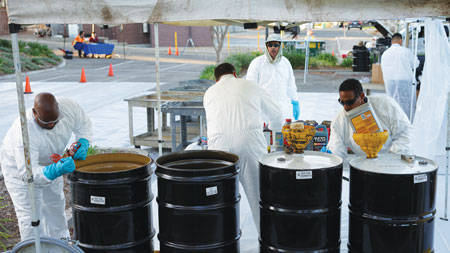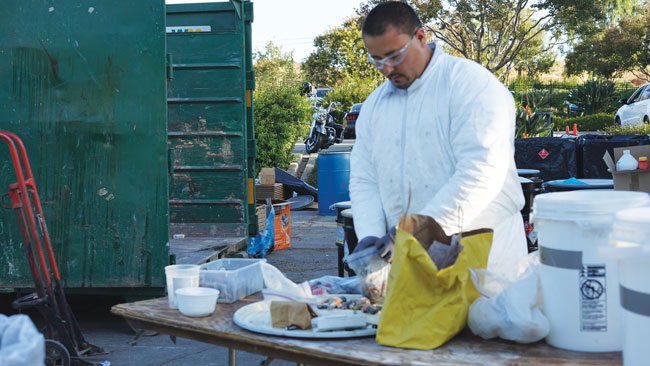From the proper disposal of hazardous waste, to companies finding new approaches to reduce, reuse and recycle, the world is ready for change. While our economy has suffered during these times, it has given companies and the world a chance to refocus their priorities.
By Bob Cappadona
As the country adapts to the unprecedented impact of the COVID-19 pandemic, both the private sector and municipalities have adjusted to the new normal in a number of key ways including better sustainability and waste disposal solutions.
Before the pandemic Americans faced increasingly complex environmental challenges, whether it was maintaining safe wastewater systems or creatively reducing and reusing waste. During this time, cities, towns and business communities have working on pivoting to the long-term goals of sustainability. And now, as that transition is being solidified, the COVID-19 pandemic is reshaping consumer behavior and how businesses approach waste disposal. These shifting dynamics have led to an accelerated adoption of cutting-edge industry solutions.

Photos courtesy of Veolia North America.
Disposing of Hazardous Waste
Each year, the U.S. generates hundreds of millions of hazardous wastes. While many household hazardous wastes can safely be recycled, other disposables are needed in landfills or incinerators. More than ever before, the ripple effects of coronavirus are challenging companies and local governments with implementing proper household hazardous waste collection and disposal.
This challenge particularly resonates for homeowners that want the best option to safely dispose of their household waste. Many homeowners have spent their quarantine reconnecting with family and working from home and, thus, have the opportunity to begin household projects such as cleaning out the basement and organizing the garage and cabinets. Often, these projects reveal hazardous waste in need of disposal. Any household product that is labeled with Danger, Warning, Toxic, Flammable or Corrosive is considered a household hazardous waste. Items such as antifreeze, aerosol cans, propane, batteries, electronics and small appliances are illegal to put in the garbage or pour down the drain.
It is important to ensure communities dispose of household hazardous waste responsibly. This includes increasing awareness of warning labels and disposal locations. Although improving awareness seems like an easy fix, there are serious consequences to avoiding hazardous waste guidelines. The EPA says long term effects include possible threat to human health and environmental pollution. As such, homeowners are encouraged to look into local drop-off or pick up options to keep their communities safe and clean.
Example: An Increase in Minnesota
A recent example during the COVID-19 statewide quarantine displays an increase of home projects in Minnesota. Minnesotans were overwhelmingly engaged in home improvement projects and cleaning out the basement or garage. Over the past weeks, Minnesota’s hazardous waste collection agency was inundated with people looking to dispose of chemicals, paints and other forms of household hazardous waste. In just the past two weeks, the state’s top household hazardous waste disposal contractor saw a 50 percent increase in household hazardous waste volumes that needed proper disposal.
In mid-March, as the pandemic took hold across the country, waste operations in 85 of 87 counties throughout Minnesota were shut down to ensure public safety. The state’s agency tasked with managing household hazardous waste—the Minnesota Pollution Control Agency (MPCA)—relied on its partnership with contractors, including Veolia North America. These partnerships were put in place to ensure that waste collection and disposal sites were cleared, and materials were properly transported and processed. Although waste collection sites were closed, Minnesotans continued to accumulate routine household hazardous wastes as home improvements produced products needing proper disposal.
The program’s first priority was focused on revamping operations to ensure the safety of the public and staff. As companies began reopening in May, Veolia worked with the MPCA and county household hazardous waste programs throughout the state to transport and properly dispose of the onslaught of materials being turned in.
Developing a Circular Economy
For years, most cities sought to have their residents separate their household hazardous waste products from the rest of their garbage. This would give cities the opportunity to have hazardous waste brought to a special collection facility or have the materials collected. The pandemic has, unfortunately, added unforeseen stresses at many facilities. Recently, many places have increasingly informed consumers about alternatives—such as reducing hazardous waste—and the hazards associated with many common household products. Recycling hazardous waste has a number of benefits including reducing the consumption of raw materials and the volume of waste materials that must be treated and properly disposed of.

By working with companies like Veolia—where I have assisted municipalities around the country on water, waste and energy solutions for 30 years—cities and organizations achieve remarkable energy efficiency, as well as savings and consumer trust, by using circular economy initiatives that reuse resources for as long as possible.
The overarching purpose of developing a circular economy is to allow businesses and communities to reduce, reuse and recycle waste. Above reducing trash in landfills and encouraging recycling, circular economies are designed to turn waste into a valuable, productive resource to be used again. By reintroducing waste into the production cycle, instead of disposing of products at the end of their useful life, businesses are able to repurpose it and allow it to be used in various forms.
In Pittsburg, CA, a process water treatment plant owned by Dow Chemical has been overhauled to be more sustainable in a region that is frequently impacted by water shortages and restrictions. As the contractor hired to perform the overhaul, Veolia has installed sophisticated chemical softening technology to improve the flow of the water moving through the plant to prevent wasteful backups. This has gone a long way in preserving water resources and reducing costs within the plant.
A report put out by the Ellen MacArthur Foundation estimates that the full value of circular opportunities could be as much as $700 billion each year in savings. Cost savings and operational efficiencies are direct incentives to implement circular initiatives, creating an additional return on investment or new sources of revenue from a service model that extracts the maximum value of resources.
A number of high-profile companies are already seeing success from implementing circular economy initiatives. For instance, Heineken went beyond just recycling glass bottles by using waste heat from a nearby factory, recycling water and selling spent grains as cattle feed. They are also working on making higher value products from the used grain by extracting the proteins, fats and other components for use in food, cosmetics and pharmaceuticals.
Meanwhile, Dell is experimenting with creating and selling jewelry made from precious metals extracted from recycled circuit boards. It is important to note that gold extracted from discarded motherboards has an environmental impact 99 percent lower than gold produced through strip mining methods.
Refocusing Our Priorities
Since the COVID-19 pandemic has crippled this country in many ways, we are seeing the initiatives that companies and homeowners are taking to ensure the safety of communities. From the proper disposal of hazardous waste, to companies finding new approaches to reduce, reuse, and recycle, the world is ready for change. While our economy has suffered during these times, it has given companies and the world a chance to refocus their priorities. People are recognizing the many benefits that develop from a circular economy and are willing to work towards a safer future. | WA
Bob Cappadona is Executive Vice President and Chief Operating Officer for the Environmental Solutions & Services division of Veolia North America. He joined Veolia Environmental Services in 1991 as the Director of Regulatory Affairs for the company’s hazardous waste management operations in Flanders, NJ. In 1996, he moved to New England to become the General Manager for the branch operations in that area, and in 2008, he became the Vice President of Service Operations for the Eastern region of the company. In 2012, Bob assumed responsibility for Veolia’s operations in the Western Region. In 2014, he became the Senior Vice President for the Environmental Solutions & Services business of Veolia’s Industrial business line. In 2015, his scope of responsibility expanded to include Veolia’s environmental business lines in Canada. In 2016, he was named Chief Operating Officer of both the ESS business and Veolia’s Industrial offerings in Canada. Bob can be reached at [email protected].
